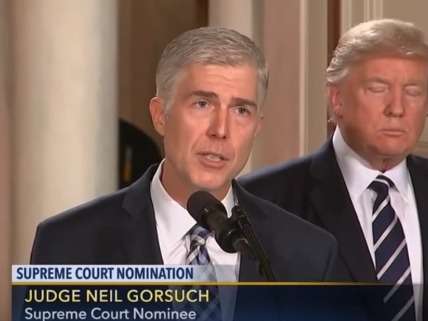As Trump Reshapes the Judiciary, Libertarian-Conservative Fault Lines Are Exposed
Libertarians and conservatives agree on Trump's judicial picks so far. But how long will the harmony last?
This week President Donald Trump announced the names of 10 judicial nominees he is putting forward to fill vacancies on federal courts around the country. It is an impressive list, featuring both distinguished legal academics and respected state judges. What's more, Trump's picks have been widely cheered on the legal right, earning kudos from both conservatives and libertarians.

Writing at the Library of Law & Liberty, John O. McGinnis also praises Trump's judicial picks and then goes on to speculate about why they have been so uniformly applauded by right-leaning legal thinkers. "Appointing judges whose ideal is to enforce the Constitution as written unites almost all strands of the political right," McGinnins notes. "For traditional conservatives, the Constitution represents an anchor against too rapid change. For libertarians, the Constitution contains valuable limitations on government power and protections of rights."
But don't conservatives and libertarians also have some pretty fundamental disagreements about the meaning of the Constitution? How long can the current harmony last on the legal right? McGinnis has some interesting thoughts:
[O]ne might wonder whether this union will survive the increasingly fierce debate between judicial engagement and judicial restraint among constitutional theorists on the right. Given the harshness of the words exchanged, it might seem surprising that Trump's judges receive praise from both quarters. These appointees, as fine as they are, cannot be simultaneously apostles of judicial engagement and judicial restraint.
In McGinnis's view, the union will hold for now because it makes sense as a temporary political alliance. But it will start to fray as the conservative legal movement enjoys greater and greater success:
Most libertarians and conservatives prefer the other's interpretive methodology as compared to the increasingly aggressive progressivism of left-liberal judicial review, because advocates of both engagement and restraint at least begin with the Constitution's original meaning. Political enemies often help bind coalition partners who are in less than full agreement. But if Trump were to replace Justices Kennedy, Breyer and Ginsburg, the theoretical debates would then gain political resonance. Political victories are never permanent in part because they make real divisions out of the theoretical fault lines that previously existed.
In other words, as more "conservative" judges are appointed to the federal bench, the various factions within the conservative legal movement will increasingly jockey for position and influence, and will increasingly clash with each other over their preferred candidates for judicial vacancies.
Here's an example of how the rift between conservative and libertarian legal thinking might play out on the national political stage. One of the names on Trump's famous list of 21 potential SCOTUS candidates was Judge William Pryor of the U.S. Court of Appeals for the 11th Circuit. Pryor is a strong advocate of judicial deference. In a 2007 article in the Virginia Law Review, for example, Pryor praised the Supreme Court for its landmark 1937 rulings in favor of New Deal regulations, such as National Labor Relations Board v. Jones & Laughlin Steel Corp., in which the Court adopted an expansive new interpretation of congressional power under the Commerce Clause, and West Coast Hotel Co. v. Parrish, in which the Court overturned its previous line of cases protecting the fundamental right to liberty of contract. "Not every controversy requires a judicial resolution or trumping of the will of the majority," Pryor wrote. In those pro-New Deal rulings, he insisted, "the judiciary wisely has acted with restraint."
Now contrast Pryor's views with those of Texas Supreme Court Justice Don Willett, whose name also appeared on Trump's SCOTUS short-list. "When it comes to regulating the economy," Willett complained in his 2015 concurrence in Patel v. Texas Department of Licensing and Regulation, "Holmesian deference still dominates" at the Supreme Court. The term Holmesian refers to Justice Oliver Wendell Holmes Jr., the patron saint of liberal and conservative devotees of judicial deference. Needless to say, Willett rejects the Holmesian approach. "The State would have us wield a rubber stamp rather than a gavel," he declared in Patel, "but a written constitution is mere meringue if courts rotely exalt majoritarianism over constitutionalism, and thus forsake what Chief Justice Marshall called their 'painful duty'—'to say, that such an act was not the law of the land.'"
Pryor and Willett are both "conservative" judges and they no doubt agree on many issues. But on this fundamental issue—do courts owe "Holmesian deference" to democratic majorities?—they are in stark disagreement. So here's a thought experiment: Imagine that Justice Anthony Kennedy retires from SCOTUS and Trump lets it be known that he is choosing between Pryor and Willett to replace him. Will the conservative legal movement still maintain its current levels of harmony?


Show Comments (60)